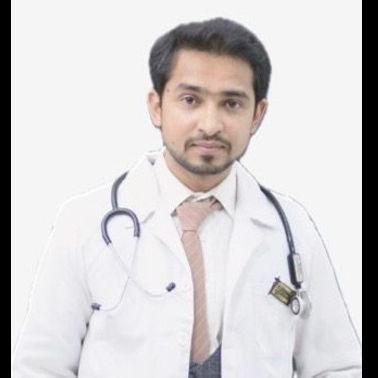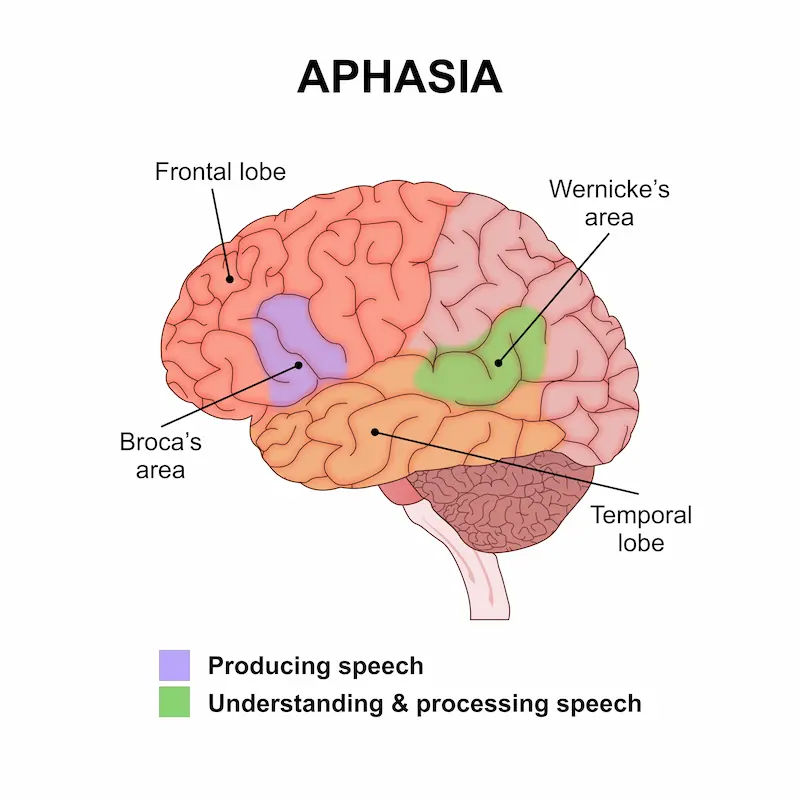Understanding Aphasia
Know about aphasia, what it is, comparison with other disorders, recognising the signs and symptoms, diagnosis, treatment options and living with aphasia and more.


Introduction
Imagine knowing exactly what you want to say but being unable to find the words. Or hearing someone speak to you, but their sentences sound like a foreign language. This is the daily reality for millions of people living with aphasia, a communication disorder that affects a person's ability to speak, understand, read, and write. This comprehensive guide will walk you through everything you need to know about aphasia, from its root causes and various types to the symptoms, modern treatment options, and practical strategies for communication and support. Our goal is to empower you with knowledge and hope on the path to recovery.
What is Aphasia? More Than Just Trouble with Words
Aphasia is an acquired communication disorder that impairs a person's capacity to process language. It is not a disease in itself but a symptom of underlying damage to the brain, typically the left hemisphere, which houses our key language centres. It's essential to distinguish aphasia from other conditions. It is not simply forgetting a word occasionally, which happens to everyone; it's a persistent and significant disruption of language abilities.
Aphasia vs. Other Communication Disorders
People often confuse aphasia with motor speech disorders like dysarthria (weakness of the muscles used for speech) or apraxia of speech (difficulty coordinating the muscle movements for speech). While these can co-occur with aphasia, they are distinct. Aphasia is a problem with language itself, the cognitive process of formulating and understanding words and sentences.
Consult a General Practitioner for Personalised Advice
The Emotional Toll of Losing Language
The psychological impact of aphasia is profound. Individuals often experience frustration, anger, depression, and social isolation. They may withdraw from conversations and activities they once enjoyed because the effort is too great or the embarrassment is too real. Acknowledging this emotional component is a critical first step in providing holistic care and support.
The Root Causes: What Leads to Aphasia?
Aphasia occurs when the brain's language networks are damaged. The most common cause is an event that interrupts blood flow to the brain.
Stroke: The Most Common Cause
Stroke is responsible for approximately 25-40% of aphasia cases. An ischemic stroke (a clot blocking a blood vessel) or a hemorrhagic stroke (a ruptured blood vessel) in the left hemisphere can damage the delicate language centres, leading to the immediate onset of aphasia symptoms. The severity and type of aphasia depend on the location and extent of the brain injury.
Other Neurological Conditions
While stroke is the leading cause, other conditions can also result in aphasia.
Traumatic Brain Injury (TBI)
A severe blow to the head from an accident or fall can cause diffuse damage to the brain, potentially affecting language pathways.
Brain Tumors
A growing tumour can press on and damage language areas. Treatment, like surgery or radiation to remove the tumour, can also cause damage.
Progressive Neurological Diseases
Some conditions, like Primary Progressive Aphasia (PPA), a type of frontotemporal dementia, cause a gradual deterioration of language skills over time, while other cognitive functions may remain relatively intact in the early stages.
Recognising the Signs: Symptoms of Aphasia
Symptoms vary widely depending on the type and severity of brain damage. They can be broadly categorised into
expressive and receptive difficulties. Many people have a mix of symptoms.
Expressive (Broca's) Aphasia Symptoms
This is often called "non-fluent aphasia." Individuals know what they want to say but struggle to get the words out. Their speech is halting, effortful, and often missing small connecting words ("the," "is"), making it sound telegraphic. For example, they might say, "Walk... dog... park..." instead of "I want to walk the dog in the park." They are usually aware of their errors, which leads to significant frustration.
Receptive (Wernicke's) Aphasia Symptoms
This is known as "fluent aphasia." Here, individuals can produce connected speech, often with a normal rhythm and rate, but the content is jumbled, nonsensical, or contains made-up words (neologisms). They often have great difficulty understanding spoken language and are frequently unaware of their mistakes, which can make communication particularly challenging.
Global Aphasia Symptoms
This is the most severe form, often seen immediately after a major stroke. It involves profound impairments in both expression and comprehension. Individuals may be limited to a few recognisable words and understand very little or no spoken language.
Getting a Diagnosis: How Aphasia is Identified
If aphasia is suspected, especially after a sudden event like a stroke, a prompt medical evaluation is critical. The diagnostic process typically involves two key components.
The Role of Medical Imaging (MRI, CT Scan)
First, doctors need to identify the underlying cause of the symptoms. A neurological exam followed by brain imaging scans, like an MRI or CT scan, is standard. These scans can reveal the location and size of a stroke, tumour, or other brain injury, providing crucial information for diagnosis and treatment planning.
Comprehensive Speech and Language Evaluation
A speech-language pathologist (SLP) will then conduct a detailed assessment. This evaluation tests the person's ability to speak, understand conversations, repeat phrases, name objects, read, and write. This helps pinpoint the specific type of aphasia and its severity, which is essential for creating a tailored therapy plan.
Treatment and Rehabilitation: Regaining Communication
While there is no direct "cure" for aphasia, the brain has a remarkable ability to reorganise and recover a quality known as neuroplasticity. Recovery is a marathon, not a sprint, and speech-language therapy is the cornerstone of treatment.
Speech-Language Therapy: The Gold Standard
Therapy focuses on improving language skills, learning new communication strategies, and using alternative communication methods (AAC) like picture boards or apps. Exercises are highly personalised. For someone with expressive aphasia, therapy might focus on naming exercises and sentence structuring. For receptive aphasia, it might involve comprehension tasks. Early and intensive therapy often yields the best outcomes..
The Role of Technology in Aphasia Therapy
Technology has opened new doors for rehabilitation. Tablet apps and computer programs allow for intensive, self-paced practice. Melodic Intonation Therapy (MIT), which uses singing to tap into the undamaged right hemisphere of the brain, has also shown promise for some individuals with non-fluent aphasia.
The Importance of Family Involvement in Recovery
Family members and caregivers are integral to the recovery process. An SLP can train loved ones on effective communication strategies, turning everyday interactions into therapeutic opportunities. A supportive and patient home environment is one of the most significant factors in long-term improvement.
Living with Aphasia: Practical Tips and Coping Strategies
Life with aphasia requires adaptation, but it can still be full and meaningful.
Communication Strategies for Caregivers
- Reduce background noise to minimise distractions.
- Keep conversations simple; ask yes/no questions.
- Be patient. Give the person plenty of time to respond. Don't finish their sentences unless they ask you to.
- Use all modes of communication: gestures, drawing, and pointing to pictures.
- Confirm understanding to ensure you're both on the same page.
Joining Support Groups and Finding Community
Connecting with others who are on a similar journey can reduce feelings of isolation. Support groups for both individuals with aphasia and their caregivers provide a safe space to share experiences, tips, and emotional support. Organisations like the National Aphasia Association are excellent resources for finding local and online communities.
Conclusion
Understanding aphasia is the first step toward overcoming the challenges it presents. It is a complex disorder that robs individuals of their primary tool for connection, language, but it does not rob them of their thoughts, their personality, or their desire to communicate. The journey of recovery requires patience, perseverance, and the right professional support, primarily through speech-language therapy. With advancements in therapy techniques and technology, and with the unwavering support of loved ones, individuals with aphasia can make significant improvements and continue to lead engaged lives. Remember, every word regained, every sentence understood, is a victory. If this article resonated with you, or if you suspect someone you know might be showing signs of aphasia, take that crucial next step and seek a professional opinion. A doctor from Apollo24|7 can provide an initial consultation and guide you toward the necessary diagnostic steps and specialist care.
Consult a General Practitioner for Personalised Advice
Consult a General Practitioner for Personalised Advice

Dr. Rajib Ghose
General Physician/ Internal Medicine Specialist
25 Years • MBBS
East Midnapore
VIVEKANANDA SEBA SADAN, East Midnapore

Dr. Mainak Baksi
General Practitioner
13 Years • MBBS , MD (MPH)
Howrah
Mainak Baksi Clinic, Howrah
(50+ Patients)

Dr. Bhargavi Botlagunta
General Physician/ Internal Medicine Specialist
14 Years • MBBS, MD - General Medicine
Bengaluru
Apollo Clinic, Sarjapur Road, Bengaluru

Dr. Imtiyaz Khan
General Practitioner
6 Years • MD (Physician), Fellowship in Critical Care,AFIH
Bengaluru
Apollo Clinic, Sarjapur Road, Bengaluru

Dr. Shiv Krishna Mitra
General Physician/ Internal Medicine Specialist
15 Years • MBBS GEN. MED. PGDRM, MCH
Kolkata
Samaritan Clinic, Kolkata
Consult a General Practitioner for Personalised Advice

Dr. Rajib Ghose
General Physician/ Internal Medicine Specialist
25 Years • MBBS
East Midnapore
VIVEKANANDA SEBA SADAN, East Midnapore

Dr. Mainak Baksi
General Practitioner
13 Years • MBBS , MD (MPH)
Howrah
Mainak Baksi Clinic, Howrah
(50+ Patients)

Dr. Bhargavi Botlagunta
General Physician/ Internal Medicine Specialist
14 Years • MBBS, MD - General Medicine
Bengaluru
Apollo Clinic, Sarjapur Road, Bengaluru

Dr. Imtiyaz Khan
General Practitioner
6 Years • MD (Physician), Fellowship in Critical Care,AFIH
Bengaluru
Apollo Clinic, Sarjapur Road, Bengaluru

Dr. Shiv Krishna Mitra
General Physician/ Internal Medicine Specialist
15 Years • MBBS GEN. MED. PGDRM, MCH
Kolkata
Samaritan Clinic, Kolkata
More articles from Aphasia
Frequently Asked Questions
1. Can aphasia be cured?
While a complete 'cure' is not always possible, many people with aphasia see significant improvement through intensive speech therapy. The brain's ability to heal and reorganise itself (neuroplasticity) allows for recovery of language skills, especially when therapy is started early.
2. Is aphasia a sign of dementia?
Not necessarily. While a type of aphasia (Primary Progressive Aphasia) is a form of dementia, the most common aphasia caused by stroke or injury is not dementia. Aphasia affects language, while dementia typically involves a broader decline in memory, thinking, and reasoning.
3. How long does recovery from aphasia take?
Recovery is highly individual. The most rapid improvement usually occurs in the first few months after a stroke or injury, but progress can continue for years with continued therapy and practice. It is a long-term process.
4. How do I talk to someone with aphasia?
Speak in simple, short sentences, reduce background noise, and be patient. Use gestures and drawings to support your words. Most importantly, include them in conversations and be a respectful listener.
5. What is the difference between apraxia of speech and aphasia?
Aphasia is a problem with language processing (finding the right word, understanding grammar). Apraxia of speech is a motor disorder where the brain has trouble coordinating the precise muscle movements needed to form clear sounds and words, even though the person knows what they want to say.

